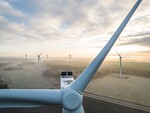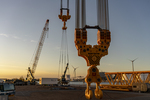08/07/2005
India - Is wind energy is the best option amongst non-conventional sources?
Last year an Indian company announced that it would be setting up a 24 mw windfarm at a project cost of Rs. 120 crore. This works out to an investment of about $1.2 per watt, which is very significantly lower than the other tried and tested non-conventional source of renewable energy, namely solar photo voltaic cells, where the initial investment is still as high as $5-$8 per peak watt. One continues to hear lot of noise about renewable sources of energy, but in reality there is very little on the ground. Despite the fact that we need to add almost 100,000 mw to our installed power capacity in the country, we are probably not serious about exploring full potential of the alternate sources.
One continues to hear lot of noise about renewable sources of energy, but in reality there is very little on the ground. Despite the fact that we need to add almost 100,000 mw to our installed power capacity in the country, we are probably not serious about exploring full potential of the alternate sources. Considering the initial investment on solar energy, this option is obviously not feasible till some revolutionary changes take place and the cost of photo voltaic cells drops down to the region of $1 per peak watt. However, at Rs 50 per watt investment, wind energy certainly seems to be an eminently feasible option, especially considering the fact that the investment figure of about $1 million per mw is more or less the same as that for conventional thermal power plants. There is of course the question of wind speeds in large parts of India and number of hours for which the wind turbines would be operational so as to determine the expected output of energy from a particular installation over, say, a whole year. Typically, one could look at about 500 hours per annum in Rajasthan and in Tamil Nadu. I am not sure if data is available for many other regions of the country, where there are good wind speeds.
Detractors of non-conventional energy sources might well argue that at such a low utilisation level (500 to 1,000 hours per annum), which represents only about 5-10 % of the total time, we are grossly over-estimating the utility of such installations. However, one should not ignore the fact that first, these installations do not cause any environmental pollution at all. Second, there are no recurring costs unlike in a thermal plant where, coal and diesel constitute huge inputs, in addition to the cost of maintenance and of course, the headaches of gross pollution and fly ash disposal etc. And finally, solar cells also don’t collect energy 24 hours a day!
We need to have a serious look at a third option also. Here I am referring to bio-mass energy. Considering the fact that we have a cattlehead population of about a billion which generate probably one to two billion tonnes of gobar annually, we are literally staring in the face of a huge source of energy. Theoretically, if all this could be processed in bio-gas plants, it would not only add significantly to our energy generation but would also produce huge quantities of nitrogenous fertilisers. Of course, there are major problems in this area too. Most of our cattle population is of the free-grazing type and as such collection of gobar could well prove to be an insurmountable task. To top it all, gobar gas plants require continuous supply of water, which is scarce even for the purpose of drinking. There are not many dairy farms with large population of cattle and most of the people own only one or two animals. At one point of time, KVIC was actively working on studying this option by producing low-cost gobar gas plants. In principle, one kg of wet gobar generates 175 (1/6th of a unit) watt hours of electrical energy.
So, where are we heading on the energy scene. The government is of course furiously working on augmenting the installed capacity in the country by putting up more thermal plants. No doubt, it is an old tried and tested method and procedures are in place to minimise the gaseous and solid pollution generated by thermal plants, but does that mean the end of the road for other sources of energy? We don’t even seem to be serious about hydro energy which is once again perennial, involves no ongoing raw material cost and causes no pollution. Will we never find a way to tackle our self-appointed activists who have managed to delay the Narmada project by a decade or more. Why don’t we seriously look at the option of mini and micro hydro plants like what China has done. This would also not pose the problem of dislocation of people and tampering with the environment.
Finally, what about atomic energy. One of the most successful examples of commercial exploitation of this source is France which produces perhaps 85% of all its energy needs by this method. In addition to France, many other European countries are also successfully exploiting this source of energy. We may, of course, have to address the issue of international inspections and other such political matters. Having looked at all possible non-conventional areas of producing energy, it appears that wind offers the cheapest and safest source. Hence, a government policy is needed on this subject to give a major push for augmenting our energy capacity.
One continues to hear lot of noise about renewable sources of energy, but in reality there is very little on the ground. Despite the fact that we need to add almost 100,000 mw to our installed power capacity in the country, we are probably not serious about exploring full potential of the alternate sources. Considering the initial investment on solar energy, this option is obviously not feasible till some revolutionary changes take place and the cost of photo voltaic cells drops down to the region of $1 per peak watt. However, at Rs 50 per watt investment, wind energy certainly seems to be an eminently feasible option, especially considering the fact that the investment figure of about $1 million per mw is more or less the same as that for conventional thermal power plants. There is of course the question of wind speeds in large parts of India and number of hours for which the wind turbines would be operational so as to determine the expected output of energy from a particular installation over, say, a whole year. Typically, one could look at about 500 hours per annum in Rajasthan and in Tamil Nadu. I am not sure if data is available for many other regions of the country, where there are good wind speeds.
Detractors of non-conventional energy sources might well argue that at such a low utilisation level (500 to 1,000 hours per annum), which represents only about 5-10 % of the total time, we are grossly over-estimating the utility of such installations. However, one should not ignore the fact that first, these installations do not cause any environmental pollution at all. Second, there are no recurring costs unlike in a thermal plant where, coal and diesel constitute huge inputs, in addition to the cost of maintenance and of course, the headaches of gross pollution and fly ash disposal etc. And finally, solar cells also don’t collect energy 24 hours a day!
We need to have a serious look at a third option also. Here I am referring to bio-mass energy. Considering the fact that we have a cattlehead population of about a billion which generate probably one to two billion tonnes of gobar annually, we are literally staring in the face of a huge source of energy. Theoretically, if all this could be processed in bio-gas plants, it would not only add significantly to our energy generation but would also produce huge quantities of nitrogenous fertilisers. Of course, there are major problems in this area too. Most of our cattle population is of the free-grazing type and as such collection of gobar could well prove to be an insurmountable task. To top it all, gobar gas plants require continuous supply of water, which is scarce even for the purpose of drinking. There are not many dairy farms with large population of cattle and most of the people own only one or two animals. At one point of time, KVIC was actively working on studying this option by producing low-cost gobar gas plants. In principle, one kg of wet gobar generates 175 (1/6th of a unit) watt hours of electrical energy.
So, where are we heading on the energy scene. The government is of course furiously working on augmenting the installed capacity in the country by putting up more thermal plants. No doubt, it is an old tried and tested method and procedures are in place to minimise the gaseous and solid pollution generated by thermal plants, but does that mean the end of the road for other sources of energy? We don’t even seem to be serious about hydro energy which is once again perennial, involves no ongoing raw material cost and causes no pollution. Will we never find a way to tackle our self-appointed activists who have managed to delay the Narmada project by a decade or more. Why don’t we seriously look at the option of mini and micro hydro plants like what China has done. This would also not pose the problem of dislocation of people and tampering with the environment.
Finally, what about atomic energy. One of the most successful examples of commercial exploitation of this source is France which produces perhaps 85% of all its energy needs by this method. In addition to France, many other European countries are also successfully exploiting this source of energy. We may, of course, have to address the issue of international inspections and other such political matters. Having looked at all possible non-conventional areas of producing energy, it appears that wind offers the cheapest and safest source. Hence, a government policy is needed on this subject to give a major push for augmenting our energy capacity.
- Source:
- Krishan Kalra
- Author:
- Edited by Trevor Sievert, Online Editorial Journalist
- Email:
- press@windfair.net
- Keywords:
- India, wind energy, wind power, wind farm, wind turbine, rotor-blade, onshore, offshore, renewable energy
Related News
China, Brazil Partnership
11/21/2024

























